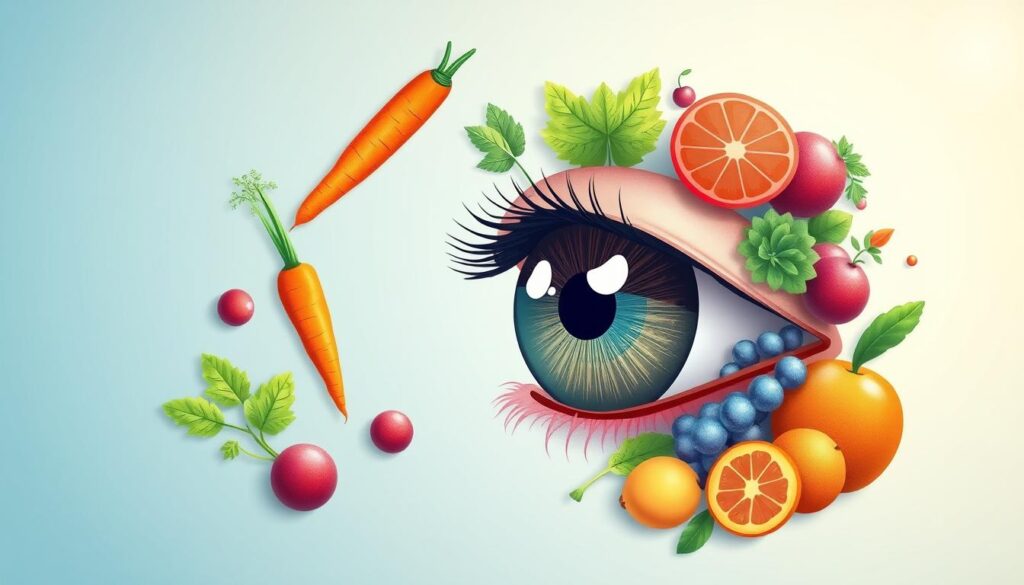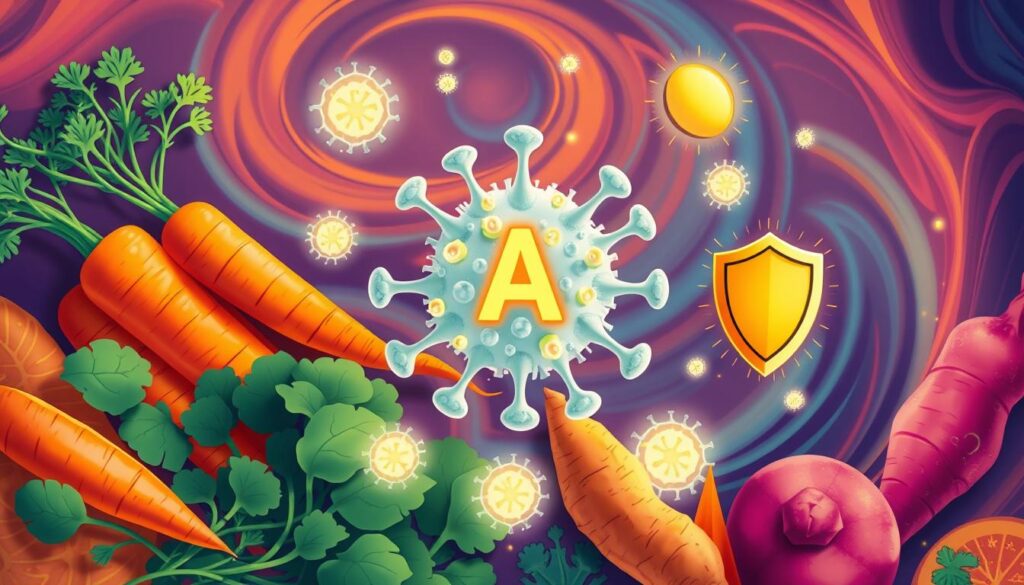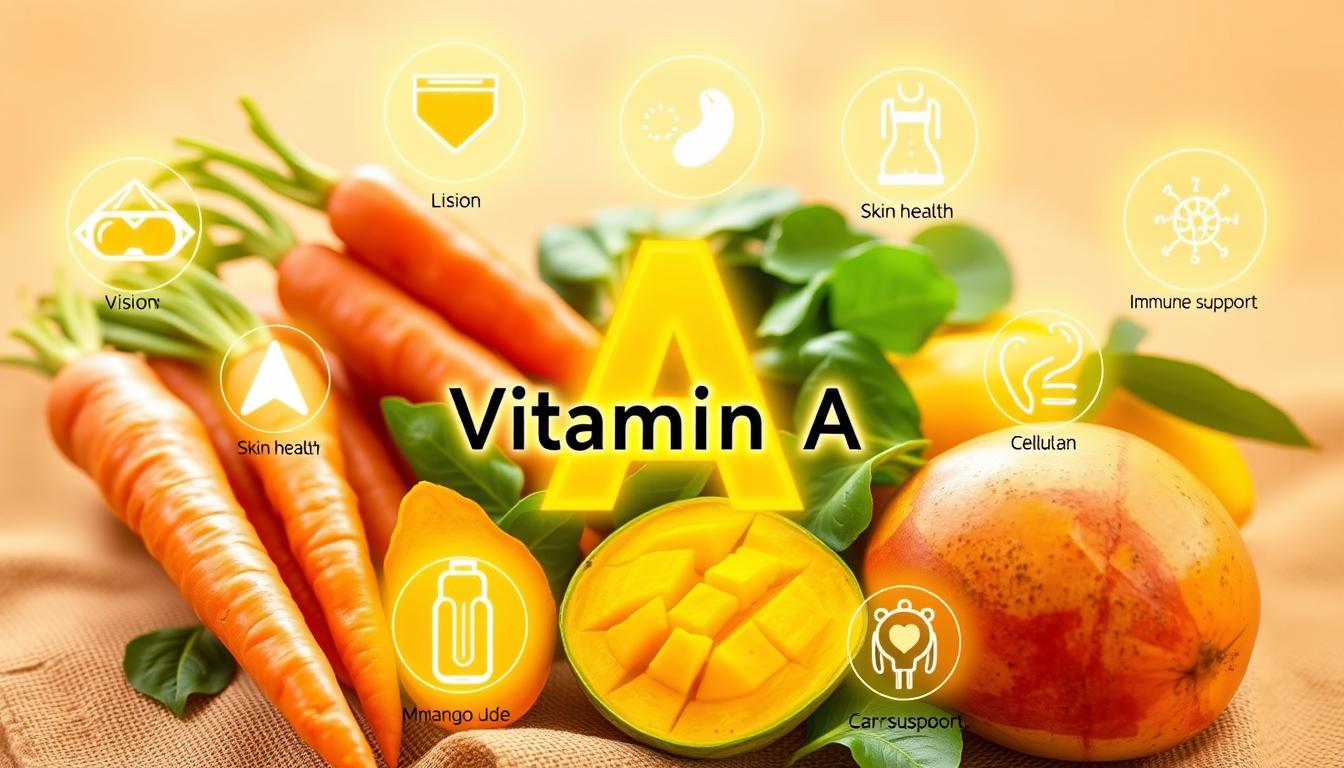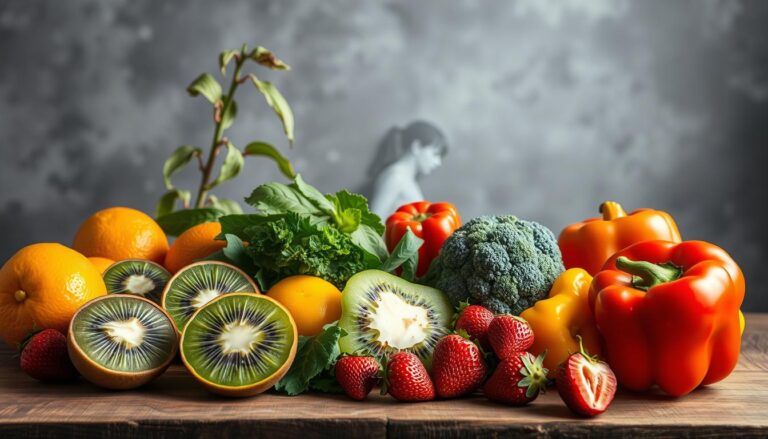Vitamin A is a fat-soluble vitamin that keeps you healthy. It helps with vision, immune function, and reproduction. Adding it to your diet can bring many benefits.
Vitamin A helps prevent night blindness and slows eye decline in older people. It also lowers cancer risk. The amount you need changes with age and sex. Men need 900 mcg, women 700 mcg, and kids 300–600 mcg.
Learning about vitamin A’s benefits is the first step. It fights deficiency and reduces infection risk. Discover how it boosts vision, immune system, and health. This knowledge helps you make better diet and lifestyle choices.
Understanding Vitamin A: Essential Nutrient for Your Body
Vitamin A is very important for your health. It helps your body in many ways. There are different types of vitamin A, like the ones found in animals and plants.
Adult men need 900 mcg RAE of vitamin A every day. Women need 700 mcg RAE. You can get vitamin A from many foods. For more info on vitamins and minerals, check out this website.
What is Vitamin A?
Vitamin A helps your eyes, immune system, and skin. It’s also important for cell growth and development.
Different Forms of Vitamin A
There are two main types of vitamin A. Animal products have preformed vitamin A. Plants have provitamin A carotenoids.
Daily Recommended Intake
The amount of vitamin A you need changes with age and sex. Here’s what you need:
- Adult men: 900 mcg RAE
- Adult women: 700 mcg RAE
- Children: 300-600 mcg RAE
The Health Benefits of Vitamin A for Your Vision
Vitamin A is key for good vision. It helps the eyes work right. Eating enough vitamin A can keep your eyes healthy as you get older.
Vitamin A makes it easier to see at night. Without enough, you might have trouble seeing in the dark. Eating foods like sweet potatoes and carrots helps your eyes at night.
Night Vision Enhancement
Studies show vitamin A is important for kids’ eyes. Kids who don’t get enough vitamin A might get myopia. Getting enough vitamin A early helps keep eyes healthy later.

Protection Against Age-Related Eye Problems
Good sources of vitamin A include beef liver and sweet potatoes. Carrots and cantaloupe are also good. Eating these foods helps keep your eyes healthy as you age.
Boosting Your Immune System with Vitamin A
Vitamin A is key for a strong immune system. It helps keep your body safe from sickness. Without enough vitamin A, your immune system can weaken.
Vitamin A helps T cells grow and work right. It also helps other immune cells do their job. This is important for fighting off germs.

- Regulating the differentiation and maturation of immune cells
- Enhancing the function of natural killer cells and neutrophils
- Supporting the development of macrophages and dendritic cells
- Reducing the risk of infections and diseases
To keep your immune system strong, eat enough vitamin A. Men need 700 µg and women need 600 µg every day. Foods like liver, sweet potatoes, and carrots are good sources. But don’t eat too much vitamin A, as it can harm you.
Vitamin A’s Role in Skin Health and Cell Growth
Vitamin A is key for healthy skin and cell growth. It helps a lot with vitamin A skin benefits. It makes fine lines and wrinkles less visible and improves skin texture.
When you add vitamin A to your skincare, your skin will look better. It will be healthier and look more vibrant.
Some big benefits of vitamin A for skin health are:
- Anti-aging properties: Vitamin A makes your skin look younger by reducing fine lines and wrinkles.
- Acne treatment: It’s good for acne, especially when used with other treatments.
- Wound healing: Vitamin A helps wounds heal faster by making more collagen and making skin stretchier.
Vitamin A is not just for skin care. You can also get it from food. Sweet potatoes and carrots are full of vitamin A. They help your skin from the inside.
Eating right and using vitamin A in your skincare can make your skin glow. It can also lower your chance of acne and early aging.
Supporting Reproductive Health and Development
Vitamin A is very important for reproductive health and development. It helps a lot during pregnancy. Research shows that vitamin A deficiency can cause birth defects and other problems. Getting enough vitamin A can help keep you and your baby healthy.
Some key benefits of vitamin A include:
- Supporting fetal development during pregnancy
- Reducing the risk of birth defects and other complications
- Regulating gene transcription in a cell-specific manner
It’s very important to have enough vitamin A, especially if you’re pregnant or breastfeeding. You can get enough vitamin A from foods like animal products and fruits and vegetables. These foods have preformed vitamin A and provitamin A carotenoids.
By focusing on vitamin A, you can help your reproductive health. This can lower the risk of problems and help you have a healthy pregnancy. Always talk to a healthcare professional about your vitamin A levels.
Natural Sources of Vitamin A in Indian Cuisine
Vitamin A is key for our health. It’s found in many foods, both plant and animal, in Indian dishes. Eating a mix of these foods helps keep vitamin A levels up. Foods like sweet potatoes, carrots, and dark greens are great sources.
Sweet potatoes, carrots, and dark greens like spinach and kale are full of vitamin A. Half a cup of spinach gives you 573 micrograms, or 64% of what you need. Mangoes and cantaloupe are also good. One mango has 112 micrograms, or 12% of your daily need. For more on vitamin A in Indian food, check out vitamin A food sources.
Plant-Based Sources
Indian food has lots of plant-based vitamin A. Here are some:
- Sweet potatoes: One whole sweet potato baked in its skin provides 1,403 micrograms of vitamin A, which is 156% of the daily value.
- Carrots: Half a cup of raw carrots contains 459 micrograms of vitamin A, representing 51% of the daily value.
- Dark leafy greens: A half-cup of boiled spinach delivers 573 micrograms of vitamin A, which equals 64% of the daily value.
Animal-Based Sources
Indian food also has animal-based vitamin A sources, though less common. Here are a few:
- Beef liver: A 3-ounce serving of pan-fried beef liver contains 6,582 micrograms of vitamin A, equivalent to 731% of the daily value.
- Cod liver oil: One tablespoon of cod liver oil provides 4,080 micrograms of preformed vitamin A.
Conclusion: Making the Most of Vitamin A in Your Daily Diet
Vitamin A is key for your health. It helps your eyes, immune system, and skin. Foods like leafy green vegetables, sweet potatoes, carrots, and dairy are full of it.
Eat a mix of these foods every day. This way, you get enough vitamin A. You might also think about taking a supplement. But, too much can be bad.
Adding vitamin A to your diet is good. It brings many health benefits. It helps keep you healthy and strong.
FAQ
What is vitamin A and what are its different forms?
Vitamin A is a fat-soluble vitamin. It has two main forms. Preformed vitamin A is in animal products. Provitamin A carotenoids are in plant-based foods.
What is the daily recommended intake of vitamin A?
The daily vitamin A intake changes with age and sex. Adult men need 900 mcg RAE. Adult women need 700 mcg RAE.
How does vitamin A benefit your vision?
Vitamin A helps a lot with night vision. It also protects against eye problems as you get older. It keeps your eyes healthy.
How does vitamin A boost your immune system?
Vitamin A is key for a strong immune system. Without enough, your immune function can suffer. Getting enough vitamin A helps fight off infections.
What are the benefits of vitamin A for skin health and cell growth?
Vitamin A is great for your skin. Without it, you might get acne or have trouble healing wounds. It also helps with aging and acne.
How does vitamin A support reproductive health and development?
Vitamin A is very important for a healthy baby. Not enough can cause birth defects. Getting enough vitamin A helps with pregnancy and birth.
What are the natural sources of vitamin A in Indian cuisine?
You can find vitamin A in many foods. Sweet potatoes, carrots, and dark leafy greens are good. Fatty fish are also good sources.
















Leave a Comment